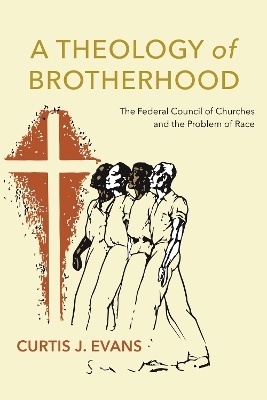
A Theology of Brotherhood
The Federal Council of Churches and the Problem of Race
Seiten
2024
New York University Press (Verlag)
978-1-4798-2044-3 (ISBN)
New York University Press (Verlag)
978-1-4798-2044-3 (ISBN)
- Lieferbar (Termin unbekannt)
- Versandkostenfrei
- Auch auf Rechnung
- Artikel merken
Examines the influence of the Federal Council of Churches’ Department of Race Relations
A Theology of Brotherhood explores how the national umbrella Christian organization, the Federal Council of Churches, acted as a crucial conduit and organizational force for the dissemination of “progressive” views on race in the first half of the twentieth century.
Drawing on years of archival research, Curtis J. Evans shows that the Council’s theological approach to race, and in particular its anti-lynching campaign, were responsible for meaningful progress in some white Protestant churches on racial issues. The book highlights the contributions that their religious vision made in expanding and propagating a civic nationalist tradition that was grounded in a “universal brotherhood” and belief in the equality of all human beings, over against a racial nationalist ideology that conceived of America in ethno-racial terms.
Evans makes the case that this predominantly white religious organization contributed a distinctive religious voice to visions of a pluralistic democracy, racial and ethnic diversity, and social and political reform. The volume adds a missing voice to the literature on lynching in the early twentieth century, which tends to focus primarily on the NAACP and other secular organizations.
A Theology of Brotherhood explores how the national umbrella Christian organization, the Federal Council of Churches, acted as a crucial conduit and organizational force for the dissemination of “progressive” views on race in the first half of the twentieth century.
Drawing on years of archival research, Curtis J. Evans shows that the Council’s theological approach to race, and in particular its anti-lynching campaign, were responsible for meaningful progress in some white Protestant churches on racial issues. The book highlights the contributions that their religious vision made in expanding and propagating a civic nationalist tradition that was grounded in a “universal brotherhood” and belief in the equality of all human beings, over against a racial nationalist ideology that conceived of America in ethno-racial terms.
Evans makes the case that this predominantly white religious organization contributed a distinctive religious voice to visions of a pluralistic democracy, racial and ethnic diversity, and social and political reform. The volume adds a missing voice to the literature on lynching in the early twentieth century, which tends to focus primarily on the NAACP and other secular organizations.
Curtis J. Evans is Associate Professor of American Religions and the History of Christianity at the University of Chicago Divinity School. He is the author of The Burden of Black Religion.
| Erscheinungsdatum | 03.02.2024 |
|---|---|
| Verlagsort | New York |
| Sprache | englisch |
| Maße | 152 x 229 mm |
| Gewicht | 431 g |
| Themenwelt | Geschichte ► Teilgebiete der Geschichte ► Religionsgeschichte |
| Religion / Theologie ► Christentum ► Kirchengeschichte | |
| Sozialwissenschaften ► Soziologie | |
| ISBN-10 | 1-4798-2044-X / 147982044X |
| ISBN-13 | 978-1-4798-2044-3 / 9781479820443 |
| Zustand | Neuware |
| Informationen gemäß Produktsicherheitsverordnung (GPSR) | |
| Haben Sie eine Frage zum Produkt? |
Mehr entdecken
aus dem Bereich
aus dem Bereich
Von den Anfängen bis zur Gegenwart
Buch | Hardcover (2022)
C.H.Beck (Verlag)
CHF 47,60
warum die Religionen erst im Mittelalter entstanden sind
Buch | Hardcover (2024)
C.H.Beck (Verlag)
CHF 53,20


